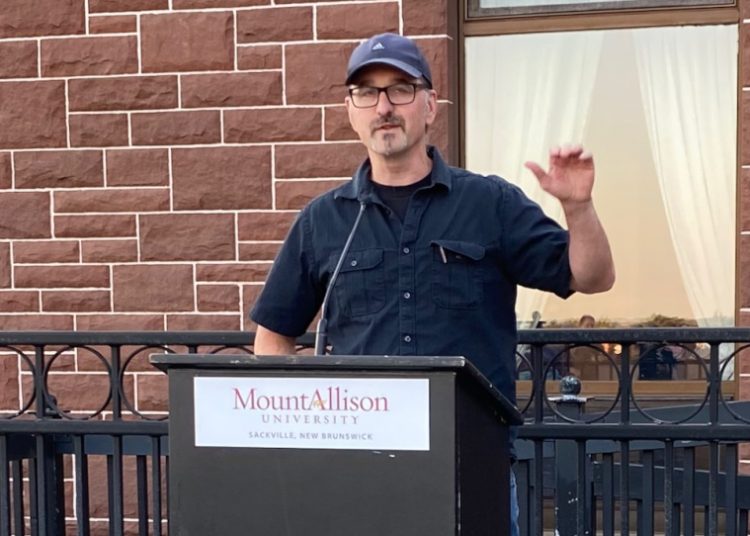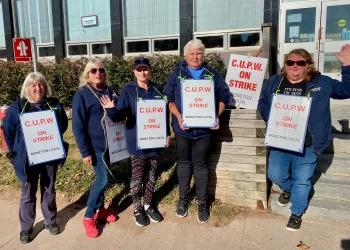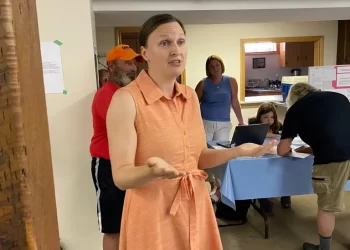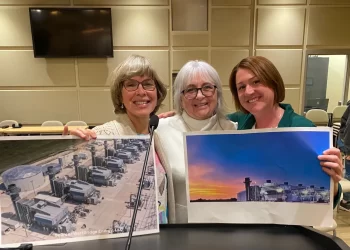T he Canadian state was built on the violent dispossession of Indigenous Peoples and the theft of their resources…
he Canadian state was built on the violent dispossession of Indigenous Peoples and the theft of their resources…
Given this reality, is it really that surprising that environmental and social harm caused by Canadian corporations abroad does not receive much attention in this country?
—Capitalism & Dispossession: Corporate Canada at Home & Abroad
Mount Allison Politics and International Relations Professor David Thomas launched a new book last week that examines the ways in which Canadian corporations acquire and profit from marginalized peoples’ land and resources both in Canada and abroad.
“Half the book looks at cases in Canada and half of it looks at cases abroad, or global cases,” Thomas told about 60 people attending the book launch on September 7 on the Mt. A. campus.
He said that the book tries to point out the deep connections between foreign and domestic land grabbing, resource extraction and plunder, and how those things are supported directly and indirectly by the Canadian government.
The book also examines the continuing resistance of local people who organize to protect their land, water, communities and ways of life.
Case studies
Capitalism & Dispossession brings together case studies written by 15 academic authors including Thomas himself, who co-edited the book with Veldon Coburn, a professor at the University of Ottawa’s Institute of Indigenous Research and Studies.
“There’s a big body of literature on Canadian corporations abroad and then there’s a big body of literature on Canadian political economy and things happening here,” Thomas said, adding that these two facets of Canadian business are typically separated hiding the deep connections between them.
“We tried to put them into one volume and then Veldon and I tried to weave some of the connections and threads together in the introduction and conclusion.”
Thomas said the foreign case studies include an examination of how a big Canadian gold mining company in the West African country of Burkina Faso is displacing local people engaged in small scale mining1 while Canadian nickel mining in the Sorowako region of Indonesia has driven some Indigenous people from their farms while offering low-paid, precarious work to others.2
The case studies in Canada include the displacement of the Ojibwe of Grassy Narrows in northwestern Ontario, from 142,000 square kilometres of land to a reserve of just over 41 square kilometres, clearing the way for mining and forestry and leaving the Indigenous people to subsist on fish and game even as the Dryden paper mill dumped nearly 10 tonnes of mercury into the English-Wabigoon river system causing widespread illness and death.
The book also examines the successful resistance of Mi’kmaw grandmothers to the Alton Gas project — a Calgary-based energy company’s plan to pump water from Nova Scotia’s Shubenacadie River to flush out underground salt deposits and create huge caverns for storing up to 10 billion cubic feet of natural gas.
Canadian complicity
“Our entire foreign service is dedicated to the promotion of corporate interests abroad,” Charlotte Connolly told the audience at the book launch.
“A lot of people don’t know that,” she added.
Connolly, who is a research assistant with the Justice and Corporate Accountability Project, is one of the authors3 of a case study on the Escobal silver mine in southern Guatemala — a mine that has received extensive support from the Canadian embassy there as well as Canada’s foreign service, now known as Global Affairs Canada.
“Essentially, the Canadian government promotes what it calls a ‘whole of government’ approach to the promotion and protection of foreign trade and direct investment abroad,” Connolly said.

“Economic diplomacy forms one part of this broader strategy and it’s described by the government of Canada as quote, ‘the harnessing of all of Canada’s diplomatic assets to support the pursuit of commercial success by Canadian companies abroad.’”
Connolly said she and her co-authors sifted through thousands of pages of embassy documents they obtained under the federal Access to Information law.
“The Canadian government considered the Escobal silver mine as a strategic capital asset,” she said.
“It was the second-largest reserve of silver in the world, which is significant and results in a lot of returns for Canadian banks and investment firms as well as Canadian pension [funds],” she added.
The documents obtained through Access to Information showed, Connolly said, how Canadian officials successfully lobbied against the Guatemalan government’s proposals to take a bigger stake in mining projects while increasing royalty payments.
They also showed Canadian indifference to military and police repression of the Xinka Indigenous people and their neighbours who launched peaceful protests against the mining project because it threatened their land and water.
She read an e-mail from then-Canadian ambassador Hugues Rousseau celebrating the approval of the mine’s operating licence on April 3, 2013;
Everyone’s perseverance finally paid off today. We are expecting quite a backlash from the opposition groups that were probably taken by surprise. However, this time both the [Guatemalan] government and the companies are ready to defend themselves with an aggressive campaign on the benefits of responsible, extractive industry activity.
“That was one of the most shocking things I read,” Connolly said, “because the campaign was very aggressive.
“Between 2012 and 2014, over 100 community members were criminalized, over 10 were shot including a 16-year-old girl and her father,” she added.
Connolly said Canadian officials suggested that the death of the 16-year-old, who was actively opposing the mine, occurred because of “street fighting” during a local parade even though an e-mail from Canada’s trade commissioner acknowledged that “some individuals, who might be employees of the mining company” may have been involved, but she did not call for a full investigation.4
“This is really just one example of many other case studies, which demonstrate how Canadian economic diplomacy in Latin America and around the world has systematically thwarted the self-determination of Indigenous and campesino communities who contest mining projects,” Connolly concluded.
Elsipogtog protests
“Are there any cops here?” Patti Musgrave Quinn asked as she began her presentation at the book launch.
Now serving as Mount Allison University’s Indigenous Affairs Coordinator, Musgrave Quinn took part in the Elsipogtog First Nation’s successful resistance to fracking exploration on their traditional lands.
Although it isn’t included as a case study in the new book, Musgrave Quinn said the Elsipogtog story is similar to the ones that are included.
She described taking photographs of hotel parking lots jammed with police vehicles in the Moncton area on October 16, 2013 and sending them to the Indigenous Warriors at Elsipogtog.
“We knew that tomorrow morning, we were dead,” she said.
Hundreds of police in riot-gear arrived that morning with dogs and snipers firing rounds of rubber bullets to enforce a court injunction against a Mi’kmag blockade that had been preventing vehicles owned by SWN Resources, a Texas-based energy company, from continuing its exploration for natural gas.
More than 40 of the protesters were arrested that day.
Musgrave Quinn said she herself was not there that morning, but watched live feeds of it.
She urged her audience to watch the YouTube video Rexton Raid showing events as they unfolded.
“That was an absolute horror scene,” she said.
“It took me a couple of years to stop crying; it took me a couple of years to drive without looking behind me; it took me a couple of years to not want to puke every time I saw a police car because I was really afraid,” she said.
“Capitalism is in bed with people that we’re supposed to depend on.”
***
- The Canadian International African Mining Gold Corporation (IAMGOLD) operates Burkina Faso’s largest gold mine.
- The nickel mine was owned for decades by Inco Ltd. and is now managed by Toronto-based Vale Canada Ltd. on behalf of its Brazilian multinational parent company. From the book: “For the Karonsi’e Dongi people who have settled back on their traditional territory, growing food has been especially difficult because the land has been degraded and made dangerous by mining and the authorities constantly harass them with eviction and arrest… Inco converted their traditional source of livelihood, fruit trees, into a world-class golf course for their executives and managers.”
- Connolly’s co-authors are Caren Weisbart and Jennifer Moore.
- In 2019, Vancouver-based Pan American Silver bought the Escobal mine from Tahoe Resources and settled a civil lawsuit in the B.C. courts apologizing to four Guatemalans who were shot by security guards during a peaceful protest in 2013. For more details, click here.
Bruce Wark worked in broadcasting and journalism education for more than 35 years. He was at CBC Radio for nearly 20 years as senior editor of network programs such as The World at Six and World Report. He currently writes for The New Wark Times, where this story first appeared on September 12, 2022.









![‘Continuum of genocide’: Pentagon funding of Sisson mine provokes renewed opposition from Wolastoq Elders [video]](https://nbmediacoop.org/wp-content/uploads/2025/07/SissonMine-2-120x86.jpg)
